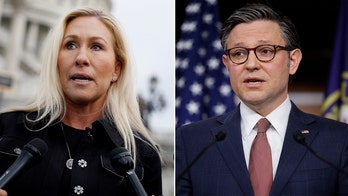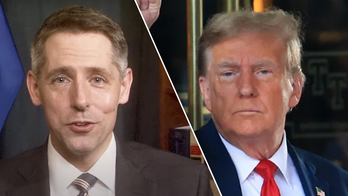Your Iowa Field Guide
DES MOINES, Iowa -- It is fitting that the first contest of the 2012 presidential election is up for grabs. After eight months of a baffling, unprecedented Republican nominating process, it should be no surprise that the Iowa caucuses are baffling too.
There are five candidates clustered within 10 points in the Real Clear Politics average for Iowa, and all but one of them have led at least once before.
There's no telling what kind of turnout there will be. Are Republicans frustrated enough with their options that they will stay home, giving the edge to the candidates with better organizations and more devoted supporters? Or, are they worried enough about a second Obama term that they will turn out anyway? And if they show up, how will they vote?
To help you keep track, Power Play offers the following cheat sheet on the candidates and their Iowa efforts.
Iowa Polling Average: 21.8 percent
Needs: A win or a victory by a candidate unable to challenge him in a national contest
"This is an election that's not being driven by money raised. It's being driven by message, a connection with the voters, debates, experience, and I think those are the features that have been driving the campaign so far. I think they will be through the entire process."
-- Former Massachusetts Gov. Mitt Romney when asked Sunday about claims by Newt Gingrich that Romney, who has spent millions on attack ads, would buy a win in the Iowa caucuses "if he could."
Mitt Romney did not expect to win in Iowa, and mostly stayed away in an effort to minimize the significance of the contest, which is famously tilted toward conservative candidates and difficult for moderates like Romney.
But, with the more conservative candidates clumped together and exhausted at the end of a brutal boom-and-bust pre-primary process, Romney may be able to do in Iowa what he is attempting to do nationally: slingshot past a divided Republican right.
A win in Iowa would be a huge boost to Romney and would help dampen turnout by conservative activists in later primaries. The sooner the inevitability train starts rolling, the faster it will be rolling when Romney gets to must-win contests like Florida and Super Tuesday.
But what really matters in Iowa for Romney is who doesn't win.
Romney would be well served by victories by libertarian Rep. Ron Paul or cultural conservative icon former Sen. Rick Santorum. Both are niche candidates who have clear ceilings in their national support and would perfectly support the original narrative from the Romney campaign that Iowa is an ideological outlier and that the caucus results should be mostly ignored.
Conversely, a win by former House Speaker Newt Gingrich or Texas Gov. Rick Perry would be problematic for Romney. Gingrich is very famous and the best-known alternative to Romney and Perry is the governor of the second-largest state and backed by many millions of dollars. Wins in Iowa could help either of them secure the position of the "not Romney" candidate in the race, thereby gaining financial support and setting themselves up to go the distance with the Massachuser.
The longer the fight on the right lasts, the better it is for Romney.
Ron Paul
Iowa Polling Average: 20.7 percent
Needs: A Win
"I was not the editor. I was the publisher. And there were some very bad sentences put in. did not write those. I did not review them. And that is an error on my part."
-- Texas Rep. Ron Paul on "State of the Union" discussing racially charged language in newsletters published under his name in the 1980s and early 1990s.
Perhaps the worst thing that happened to Ron Paul was showing his strength in Iowa too soon.
Paul had been chugging along with a consistent 10 percent of the vote in Iowa, the same share he got in the 2008 caucuses. He was very successful in blowing up frontrunner for a fortnight Newt Gingrich. Paul's attacks on Gingrich's work for Freddie Mac, his anti-global warming activism and other conservative apostasies helped permanently puncture Gingrich in Iowa, and perhaps across the country.
Paul, who offers the most unalloyed brand of conservatism in the field was well-situated to benefit and saw his support double in the span of just a few weeks.
But many Iowans fear a Paul win exactly because it would largely confirm the narrative of the Romney campaign that the caucuses are a niche event for conservatives. As Gov. Terry Branstad told Chris Wallace: Iowa "won't count" if Paul wins.
Those fears, combined with a lot of attention to some unsavory, racist language in Paul's old newsletters, have left Paul dangling at the end.
The big question is how Paul's army of loyal supporters will play on caucus night.
The biggest advantage that Paul has is the devotion of his supporters, but it isn't all positive. The caucuses are an interactive process in which like-minded folks huddle together, listen to speeches from supporters and generally move in a pack. Its good that Paul has so many folks in so many places, but if Iowans leaning toward Paul don't like what they see -- too many college kids or too much talk about drugs or foreign policy -- it could backfire.
What Paul needs is a win to demonstrate that he is electable. If he doesn't get that, though, finishing second to Romney would be enough to get Paul a boost and help him with a repeat performance in New Hampshire.
Rick Santorum
Iowa Polling Average: 15.5 percent
Needs: To beat Ron Paul
"People have asked me 'When are you going to get your surge. Your message must not be resonating.' And I've been saying all along: Our surge is going to come on Jan. 3 when the people of Iowa do what they do..."
-- Former Pennsylvania Sen. Rick Santorum on "Meet the Press."
Rick Santorum has been running on the explicit message that Ron Paul must be stopped, for the sake of the Republican Party and for Iowa's reputation.
Santorum has gone after Paul repeatedly for his opposition to international interventions and for Paul's libertarian stances on social issues. But now he adds to that a promise to defend Iowa's honor.
And orthodox Catholic who has focused on the many home schoolers and the large network of social conservatives in the state, Santorum has laid himself at the feet of Iowa voters for months, not campaigning seriously in any other state.
The essence of Santorum's argument in Iowa is that by picking him, conservatives won't be embarrassed later and that nobody loves them like Santorum.
The question for Iowa conservatives is this: if they don't believe Romney can be stopped, what message do they want to send to the national GOP. Giving Paul a win or second place finish to Romney would be flipping the bird, or maybe even mooning. Picture a headline: Unhappy With Options, Iowans Pick Paul in Protest.
The message from a Satorum win or second-place finish behind Romney would be the same one from Mike Huckabee's 2008 win: social issues matter most in Iowa.
Newt Gingrich
Iowa Polling Average: 13.8 percent
Needs: Top-three finish
"He's a Massachusetts moderate at best. He registered as a Democrat to vote for Paul Tsongas, who was the most liberal guy in 1992 running. He called himself a moderate running for governor in 2002. He signed a bill that has tax-paid abortion, and has Planned Parenthood with an official position in Romneycare. Those aren't conservative positions."
-- Former House Speaker Newt Gingrich in an interview with Bret Baier.
Former House Speaker Newt Gingrich explains that the reason he delayed in counterpunching against a barrage of attacks from Mitt Romney is that Gingrich is running "an experiment."
But conservative voters were willing to embrace the idea of Gingrich as their champion despite his personal and ideological deviations on the grounds that he could get the job done. The surge for Gingrich was a result of voters on the right settling for Gingrich on the grounds that he could go the distance with Romney, prevail and then beat Barack Obama.
During the salad days, Gingrich said it best in an interview with a South Carolina radio station: "I don't claim to be the perfect candidate. I just claim to be a lot more conservative than Mitt Romney and a lot more electable than anybody else,"
While Gingrich has disarmed his critics and questioners by freely admitting mistakes ("the single dumbest thing..." etc.) the question of his electability is reinforced with each admission. And if Gingrich isn't electable, why wouldn't conservatives go for purity?
Gingrich needs to beat expectations on Tuesday and revive his electability argument against the other conservative contenders. While Gingrich can soldier on if he loses to Romney and even if he finishes behind either Paul or Santorum, anything beyond that would make his case to voters in later states much harder to make.
Rick Perry
Iowa Polling Average: 11.7 percent
Needs: To beat Newt Gingrich
"We're going to be able to go forward when some of these other candidates, they may do OK in Iowa, but when it comes to running a national campaign, they're going to falter."
-- Texas Gov. Rick Perry on "FOX News Sunday with Chris Wallace."
In the latest Des Moines Register poll, Rick Perry tied Mitt Romney on the question of which candidates Republicans couldn't support as their general-election nominee.
Only a fifth of respondents said they wouldn't vote for Perry or Romney in November, less than the rest and a full 10 points better than Gingrich. Perry also scores well on likeability and on "relating to ordinary Iowans."
So they like him, but they still say they're voting for someone else. But that general-election support may hold the key for a Perry comeback. While those numbers don't predict general election behavior, they are a good measure of presidential plausibility and broad consensus.
After a disastrous fall, Perry has regained his footing, doubling his overall support since mid-November in the Register poll. He's been all over Iowa and heavily emphasizing his faith, family values and farm-boy roots. It's a big improvement over the swaggering brawler who first strode onto the stage challenging Mitt Romney to put up his dukes.
But Perry's debate performances have left a serious mark on Republicans' estimation of his ability to beat Barack Obama. If the Perry comeback is going to be for real, he has to beat Newt Gingrich in Iowa and claim the position of broadly acceptable conservative alternative to Mitt Romney.
Perry can live with a loss to Romney, or even a third-place finish behind Romney and either Santorum or Paul, but he must overtake Gingrich is he wants to have something worth saying to skeptical South Carolinians.
Iowa Polling Average: 7.8 percent
Needs: A top-three finish
"We need an American Iron Lady. We need an American who is strong, and a female."
-- Minnesota Rep. Michele Bachmann talking to supporters at her Iowa headquarters with a reference to the new Margaret Thatcher biopic "The Iron Lady."
Michele Bachmann's candidacy has always been improbable. She is a three-term congresswoman from Minnesota who has chased after (and been chased by) controversial issues throughout her career.
A lightning rod member of the House is just not the kind of person whom political parties nominate.
And while she led in a few Iowa polls in the summer, Bachmann's role in the 2012 process has been mostly about the damage she inflicted on contenders, skewering, in turns, Tim Pawlenty, Perry, Herman Cain and Paul. Every frontrunner but Romney.
Bachmann is an Iowa native and has campaigned relentlessly in the state, but still finishes last among the candidates contesting the Iowa caucuses. It's hard to see how anything other than a shocking top-three finish wouldn't make Tuesday the beginning of the end for Bachmann.
Republicans do not seem to agree with the central premise of her candidacy: That President Obama will certainly lose and that Republicans should worry more about purity than plausibility.
Chris Stirewalt is digital politics editor for Fox News, and his POWER PLAY column appears Monday-Friday on FoxNews.com.




